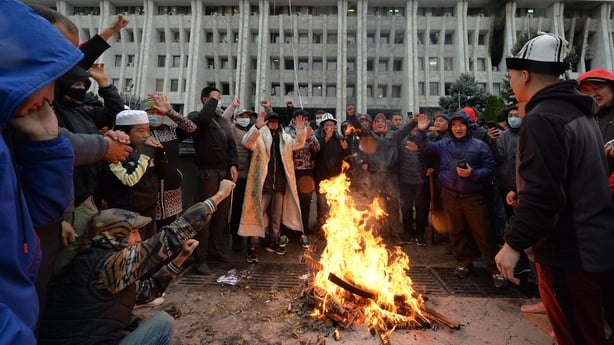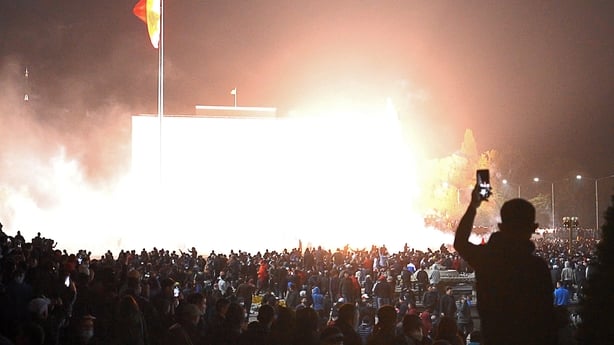Kyrgyzstan's prime minister Kubatbek Boronov has resigned after widespread unrest pushed the country's electoral body to cancel the results of Sunday's parliament elections.
Mr Boronov, an ally of pro-Russian President Sooronbay Jeenbekov, was replaced by a nationalist politician released from jail by protesters the day before.
Unrest over the vote left almost 700 hurt and one dead and appeared to be spreading to other parts of the country, raising concerns from Russia which has a powerful stake in the country.
The ex-Soviet nation's Central Electoral Commission said that it had "invalidated the election results" which saw parties close to Mr Jeenbekov dominate results amid accusations of mass vote-buying.
The results sparked a tumultuous Monday night in the capital Bishkek, with protesters seizing government buildings and freeing high-profile politicians from prison, including a former president, Almazbek Atambayev.
The new Prime Minister, Sadyr Japarov, was elected during an extraordinary meeting in a hotel after protesters seized the legislative building, the parliamentary press service said.
In Moscow, President Vladimir Putin's spokesman Dmitry Peskov told reporters that the Kremlin was "certainly concerned" over the unrest.
Russian military authorities said they had beefed up security at their military base outside the capital.
Bishkek was calmer today, although the government house remained under the control of protesters and there were some reports of crowds roaming the streets targeting businesses and other organisations.
Mr Jeenbekov's office said the president had remained in the capital, despite not making any public appearances.
But reports indicated that unrest was spreading beyond the capital with several gold and coal mines - critical to the threadbare state budget - seized or damaged by marauders.

More than a dozen political parties said they had formed a "coordination council" to restore stability and "return to the rule of law", criticising the presidency for failing to ensure a fair election.
However, the new prime minister's party has refused to recognise the council.
Mr Boronov was seen as a technocrat and ally of President Sooronbay Jeenbekov, while Mr Japarov has a reputation as an independent, headstrong nationalist.
Mr Jeenbekov has insisted the situation in the country is under his control, and accused "several political forces" of attempting to seize power.
"I ordered law enforcement agencies not to open fire or shed blood, so as not to endanger the life of a single citizen," he said.

A court in Bishkek reversed Mr Japarov's 11.5-year conviction for hostage-taking and other crimes that he began serving in 2018.
Banks and many shops and restaurants were closed in central Bishkek, with storeowners removing their goods over looting fears.
Weakened security after uprisings in 2005 and 2010 saw criminal gangs target mining enterprises that are typically in remote locations.
Business associations called on political parties to ensure stability in order to help businesses facing "huge losses" over the coronavirus pandemic in a joint letter.
Opposition supporters had poured onto Bishkek's streets yesterday to demand the president's resignation and a re-run of Sunday's poll that left three parties from the outgoing parliament out in the cold.
The peaceful demonstrations in Bishkek turned violent later after clashes with police.
Some protesters then marched to the State National Security Committee building where former president Atambayev was jailed.

